[Update 4:26pm PT: Related to the story below, one of the victims of the Tucson shooting has just been arrested for issuing a threat against Rightwingers at a taping for an ABC News special. It seems incitements by some are taken more seriously than incitements by others. Story here... -BF]
Guest blogged by Ernest A. Canning
"I find it chilling to hear so many U.S. government officials calling for the leader of this organization, Julian Assange, to be labeled an 'enemy combatant' and jailed --- or worse."-Letter from Rep. Ron Paul (R-TX) to Tom Hayden
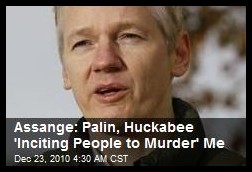 Recently, a number of prominent politicians and pundits have called for the violent targeting of other individuals who have been neither accused nor charged with any crimes whatsoever, calling into the question the legality of such incitements to violence.
Recently, a number of prominent politicians and pundits have called for the violent targeting of other individuals who have been neither accused nor charged with any crimes whatsoever, calling into the question the legality of such incitements to violence.
This article will transcend the issue of "moral responsibility" on the part of those politicians and pundits for the horrific consequences that may, and often do, ensue as the result of their deliberate appeals to fear, prejudice and hate so as to examine when such rhetoric actually amounts to an actual crime under the laws of our land.
There can be little doubt that, as observed by Pima County Sheriff Clarence Dupnik, the combination of 24/7 "vitriolic rhetoric" on TV and radio (See video below for poignant examples of such rhetoric), the absence of gun control, with leading U.S. politicians calling for "Second Amendment remedies," and the placement of "crosshairs" over a political opponent's district while calling on citizens to "reload," can produce lethal consequences --- consequences that are not limited to the actions of the deranged.
Such rhetoric is both the product and cause of dehumanization --- a process defined by Professor Phillip Zimbardo in The Lucifer Effect as a means "by which certain other people or collectives of them are depicted as less than human..."
Zimbardo writes:
Where we covered the scientific work of Zimbardo and others in "Hate Speech and the Process of Dehumanization," and in a follow-up, demonstrating how the process applies both when directed to foreign "threats" and domestic "foes," here the focus is the thin legal line, unique to the U.S. courtesy of the First Amendment, between advocacy and incitement, and whether some U.S. politicians and pundits may have, at least in the case of WikiLeaks and Julian Assange as they have now charged, crossed that line so as to possibly warrant criminal prosecutions...
The Brandenburg distinction between advocacy and incitement
During a December 8 appearance on Democracy Now, Jennifer Robinson, one of the attorneys who represents Assange in his U.K. extradition proceedings, observed that people who have publicly called for the assassination of her client "ought to be reported to the police for incitement to violence."
Robinson noted that a former adviser to Canadian Prime Minister Stephen Harper --- Thomas Flannagan, who said: "I think Assange should be assassinated...Obama should put out a contract or...use a drone..." --- was now "the subject of a police complaint, and the file has gone to the director of public prosecutions in Canada."
But words that may constitute a crime in either the U.K. or Canada are not necessarily a crime in the U.S.
In Brandenburg vs. Ohio the U.S. Supreme Court held that the First Amendment shields individuals who merely advocate the violent overthrow of the government. This does not mean that all forms of speech are protected.
Under Brandenburg, speech can be prohibited if it is "directed at inciting or producing imminent lawless action" that is "likely to incite or produce such action."
Shock jock convicted of inciting others to kill federal judges
The question of whether the speech is likely to incite is a thorny one, though it is certainly not insurmountable. Just ask the right-wing, racist, former shock jock (and one time FBI informant) Hal Turner. Turner was convicted of incitement after he responded to a decision by three federal judges, who upheld Chicago's handgun ban, by posting the judges' photos and work addresses, adding: "Let me be the first to say this plainly: These judges deserve to be killed."
U.S. politicians/pundits who may have crossed the line
 The WikiLeaks press release which The BRAD BLOG recently posted after it was released following the deadly shootings in Tucson, provides a partial list of the individuals and statements that seem on par with Hal Turner's transgression.
The WikiLeaks press release which The BRAD BLOG recently posted after it was released following the deadly shootings in Tucson, provides a partial list of the individuals and statements that seem on par with Hal Turner's transgression.
*Limbaugh also said: "Back in the old days when men were men and countries were countries, this guy would die of lead poisoning from a bullet in the brain."
Of course, where Turner did not specify who should kill the three judges, many of the pundits and politicians were asking the U.S. government to murder Assange. Would that make the incitement unlikely under the second part of the Brandenburg test?
Consider convicted Watergate-era criminal and current Rightwing radio host G. Gordon Liddy's remark: "This fellow Anwar al-Awlaki --- a joint U.S. citizen hiding out in Yemen --- is on a 'kill list' [for inciting terrorism against the U.S.]. Mr. Assange should be put on the same list."
Consider the Obama administration's targeting of an American citizen merely "suspected" of being a terrorist for assassination in the context of Vice President Joe Biden's recent description of Assange as a "high tech terrorist," and you begin to see not only the likelihood of incitement but the real reason why the current U.S. Department of Justice has failed to initiate prosecutions of any of these high profile pundits and politicians.
The fact that President Obama has chosen not only to follow but expand a lawless 'Unitary Executive' that has engaged in secret wars, torture, and, now, the claimed right to execute an American citizen abroad without due process of law does not make lawful that which is decidedly unlawful.
Nineteen states have laws making it a crime to utter a terrorist threat. A terrorist "threat is...generally defined as threatening to kill another with the intent of putting that person in fear of imminent death and under circumstances that would reasonably cause the victim to believe that threat will be carried out."
Rightwing radio and Fox "News" host Glenn Beck's musings about wanting to kill Michael Moore, either himself or by hiring a hit man; Michael Reagan's call to "take out" and "shoot" 9/11 conspiracy theorists, he'll "pay for the bullet" (see video below), as well as the calls to assassinate Assange, who has been neither accused nor convicted of any crime related to these matters, would appear to fall within the definition of a "terrorist threat."
If we are still a government of laws, then surely there should be prosecutions of powerful pundits and politicians who use our public airwaves to broadcast terrorist threats that amount to incitement to murder. Death threats have no legitimate place within our nation's political discourse.
MEMO TO SARAH PALIN: When someone criticizes your use of violence-inciting words and imagery, they are not violating your First Amendment rights. They are simply exercising their First Amendment rights. Your effort, or that of your ghostwriter, to play the victim card is nothing short of Orwellian.
UPDATE 01/16/11 Last night, Brad Friedman posted an update relating to the arrest of J. Eric Fuller, who was shot in the knee by Jared Lee Loughner, after Fuller took the picture of a Tuscon Tea Party founder, and said, “You’re dead.”.
Brad's update raises the question of whether there is, as promised above the portico of the U.S. Supreme Court, "Equal Justice Under Law" when we deal with issues of incitement to commit violence.
If there is, then it should not matter whether the target of the threat is a government official, a 9/11 conspiracy theorist or a foreign journalist, like Julian Assange. It should not matter whether the author of that threat is an emotionally disturbed, 33-year old Norman Leboon, who was arrested when he threatened to kill Rep. Eric Cantor (R-VA), the son of a former President or the 2008 Republican nominee for Vice President.
In commenting on the Leboon arrest, U.S. Attorney Michael Levy said [emphasis added]:
Video montage of hate radio courtesy of Crooks and Liars and Bill Moyers Journal...
Ernest A. Canning has been an active member of the California state bar since 1977. Mr. Canning has received both undergraduate and graduate degrees in political science as well as a juris doctor. He is also a Vietnam vet (4th Infantry, Central Highlands 1968).


 It's About Elections and the Windmills of His Mind: 'BradCast' 1/29/26
It's About Elections and the Windmills of His Mind: 'BradCast' 1/29/26 'Green News Report' 1/29/26
'Green News Report' 1/29/26
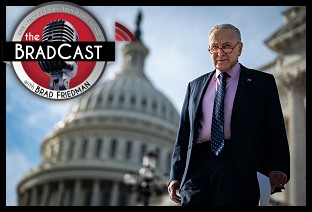 Govt Shutdown Over ICE Funding Near Certain This Weekend: 'BradCast' 1/28/26
Govt Shutdown Over ICE Funding Near Certain This Weekend: 'BradCast' 1/28/26 Trump Blinks, Bovino Out, MN Op Falters but Continues as Midterm Accountability Looms: 'BradCast' 1/27/26
Trump Blinks, Bovino Out, MN Op Falters but Continues as Midterm Accountability Looms: 'BradCast' 1/27/26 'Green News Report' 1/27/26
'Green News Report' 1/27/26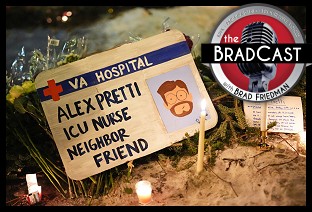 The ICE Murder of ICU Nurse Alex Pretti and the Heroes of Minneapolis: 'BradCast' 1/26/26
The ICE Murder of ICU Nurse Alex Pretti and the Heroes of Minneapolis: 'BradCast' 1/26/26  The BRAD BLOG: 22 Years and Still Counting
The BRAD BLOG: 22 Years and Still Counting Sunday 'Worth a Thousand Words' Toons
Sunday 'Worth a Thousand Words' Toons Mr. Smith Testifies (Publicly) in Washington: 'BradCast' 1/22/26
Mr. Smith Testifies (Publicly) in Washington: 'BradCast' 1/22/26 'Green News Report' 1/22/26
'Green News Report' 1/22/26 World Turning Against Self-Destructing U.S. Under Trump: 'BradCast' 1/21/26
World Turning Against Self-Destructing U.S. Under Trump: 'BradCast' 1/21/26 Trump Admin Waste, Fraud, Abuse on Voting, at DOJ, by DOGE: 'BradCast' 1/20/26
Trump Admin Waste, Fraud, Abuse on Voting, at DOJ, by DOGE: 'BradCast' 1/20/26 'Green News Report' 1/20/26
'Green News Report' 1/20/26 Sunday 'Domestic Terrorist' Toons
Sunday 'Domestic Terrorist' Toons 'Green News Report' 1/15/26
'Green News Report' 1/15/26 'A Cornered Rat': Trump Terrorizes Minneapolis, Menaces NATO, World: 'BradCast' 1/15/26
'A Cornered Rat': Trump Terrorizes Minneapolis, Menaces NATO, World: 'BradCast' 1/15/26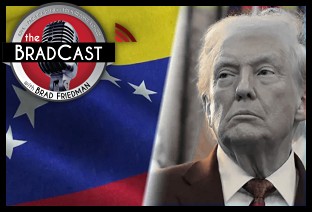 'Not Close to Over': Mad King Trump in Venezuela (& Beyond): 'BradCast' 1/14
'Not Close to Over': Mad King Trump in Venezuela (& Beyond): 'BradCast' 1/14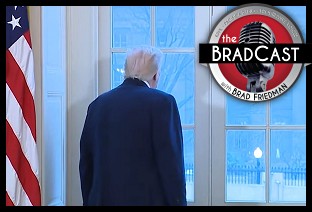 Things Getting Weirder as Trump Keeps Losing: 'BradCast' 1/13/26
Things Getting Weirder as Trump Keeps Losing: 'BradCast' 1/13/26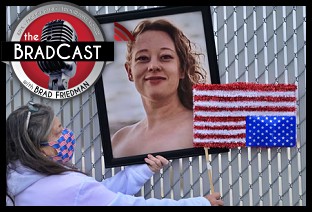 After ICE Murder in MN, Local Cops Disown Fed Policing Practices: 'BradCast' 1/12/26
After ICE Murder in MN, Local Cops Disown Fed Policing Practices: 'BradCast' 1/12/26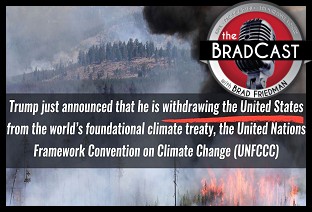 Trump to Congress, Climate, U.N., Rule of Law: DROP DEAD - 'BradCast' 1/8/26
Trump to Congress, Climate, U.N., Rule of Law: DROP DEAD - 'BradCast' 1/8/26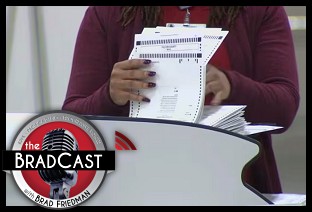 'Nonsense': Trumpers Claim 315k Fraudulent GA Votes in 2020: 'BradCast' 1/7/26
'Nonsense': Trumpers Claim 315k Fraudulent GA Votes in 2020: 'BradCast' 1/7/26 Jack Smith Testimony on Trump J6 Crimes, DOJ Weaponization: 'BradCast' 1/6/26
Jack Smith Testimony on Trump J6 Crimes, DOJ Weaponization: 'BradCast' 1/6/26 Trump War on Venez. is About Ego, Power, 'Alien Enemies Act': 'BradCast' 1/5/26
Trump War on Venez. is About Ego, Power, 'Alien Enemies Act': 'BradCast' 1/5/26
 VA GOP VOTER REG FRAUDSTER OFF HOOK
VA GOP VOTER REG FRAUDSTER OFF HOOK Criminal GOP Voter Registration Fraud Probe Expanding in VA
Criminal GOP Voter Registration Fraud Probe Expanding in VA DOJ PROBE SOUGHT AFTER VA ARREST
DOJ PROBE SOUGHT AFTER VA ARREST Arrest in VA: GOP Voter Reg Scandal Widens
Arrest in VA: GOP Voter Reg Scandal Widens ALL TOGETHER: ROVE, SPROUL, KOCHS, RNC
ALL TOGETHER: ROVE, SPROUL, KOCHS, RNC LATimes: RNC's 'Fired' Sproul Working for Repubs in 'as Many as 30 States'
LATimes: RNC's 'Fired' Sproul Working for Repubs in 'as Many as 30 States' 'Fired' Sproul Group 'Cloned', Still Working for Republicans in At Least 10 States
'Fired' Sproul Group 'Cloned', Still Working for Republicans in At Least 10 States FINALLY: FOX ON GOP REG FRAUD SCANDAL
FINALLY: FOX ON GOP REG FRAUD SCANDAL COLORADO FOLLOWS FLORIDA WITH GOP CRIMINAL INVESTIGATION
COLORADO FOLLOWS FLORIDA WITH GOP CRIMINAL INVESTIGATION CRIMINAL PROBE LAUNCHED INTO GOP VOTER REGISTRATION FRAUD SCANDAL IN FL
CRIMINAL PROBE LAUNCHED INTO GOP VOTER REGISTRATION FRAUD SCANDAL IN FL Brad Breaks PA Photo ID & GOP Registration Fraud Scandal News on Hartmann TV
Brad Breaks PA Photo ID & GOP Registration Fraud Scandal News on Hartmann TV  CAUGHT ON TAPE: COORDINATED NATIONWIDE GOP VOTER REG SCAM
CAUGHT ON TAPE: COORDINATED NATIONWIDE GOP VOTER REG SCAM CRIMINAL ELECTION FRAUD COMPLAINT FILED AGAINST GOP 'FRAUD' FIRM
CRIMINAL ELECTION FRAUD COMPLAINT FILED AGAINST GOP 'FRAUD' FIRM RICK SCOTT GETS ROLLED IN GOP REGISTRATION FRAUD SCANDAL
RICK SCOTT GETS ROLLED IN GOP REGISTRATION FRAUD SCANDAL VIDEO: Brad Breaks GOP Reg Fraud Scandal on Hartmann TV
VIDEO: Brad Breaks GOP Reg Fraud Scandal on Hartmann TV RNC FIRES NATIONAL VOTER REGISTRATION FIRM FOR FRAUD
RNC FIRES NATIONAL VOTER REGISTRATION FIRM FOR FRAUD EXCLUSIVE: Intvw w/ FL Official Who First Discovered GOP Reg Fraud
EXCLUSIVE: Intvw w/ FL Official Who First Discovered GOP Reg Fraud GOP REGISTRATION FRAUD FOUND IN FL
GOP REGISTRATION FRAUD FOUND IN FL

































